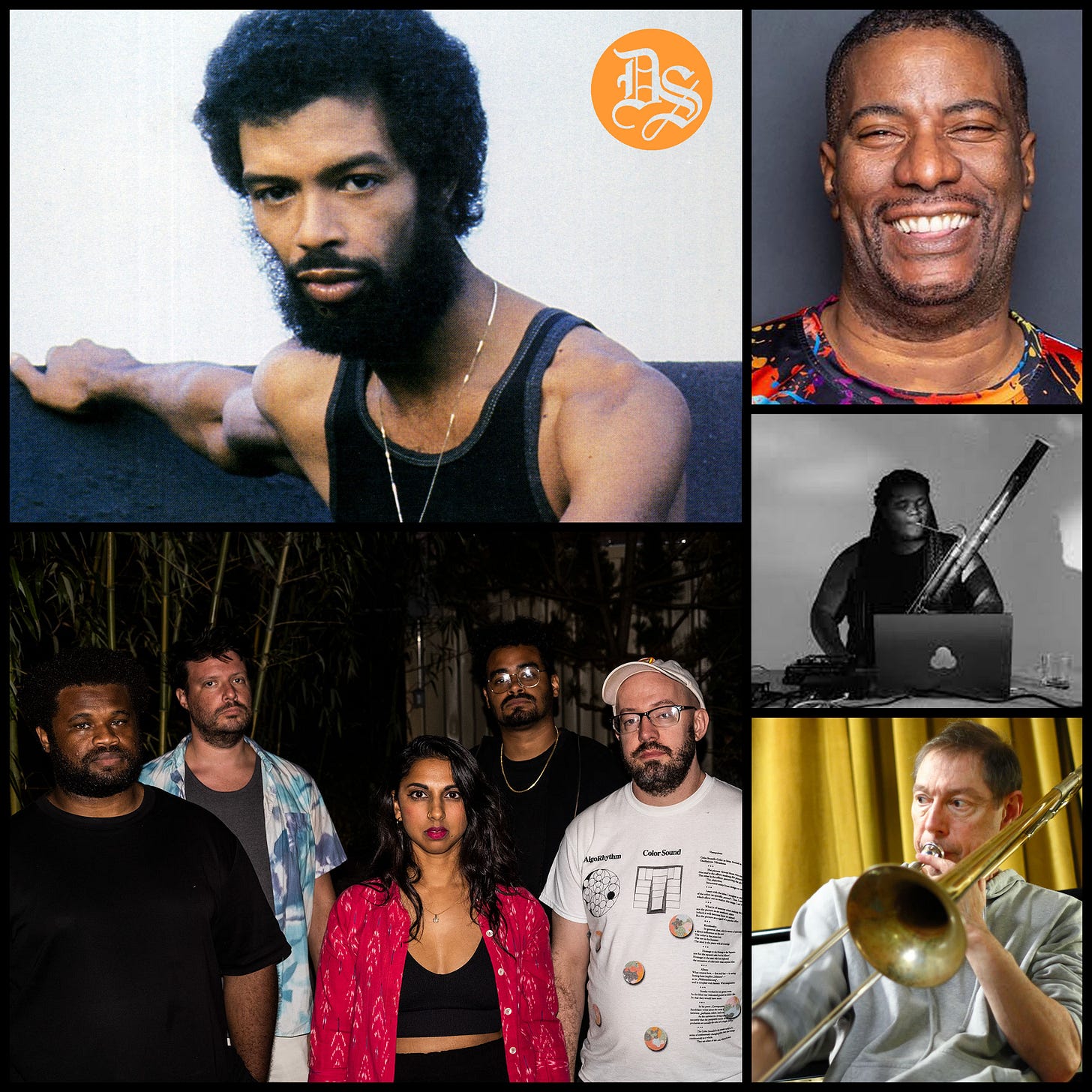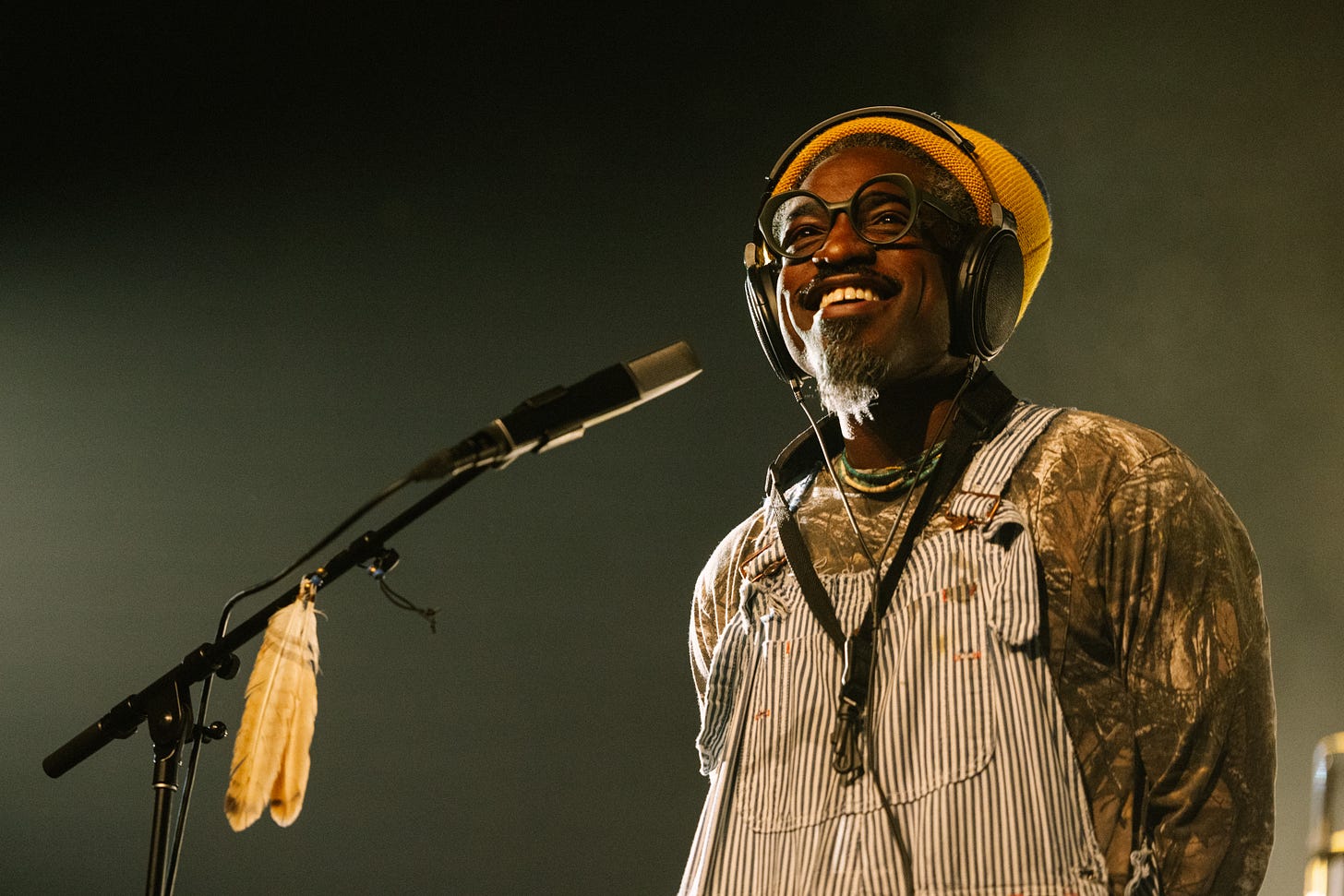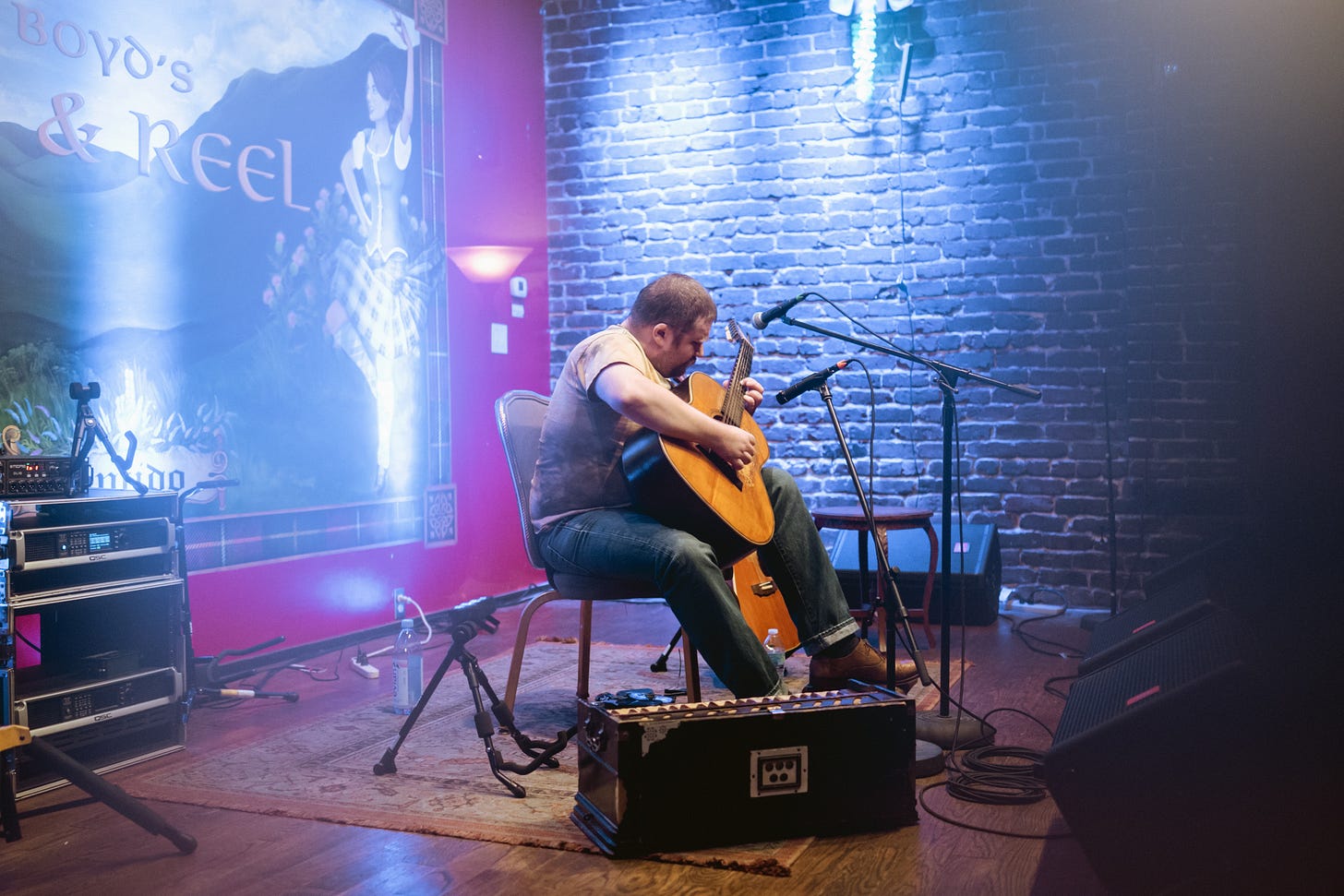Big Ears, Full Hearts, Possible Futures | Bklyn Sounds 3/27/2024—4/2/2024
Things I learned, and was reminded of, at Big Ears in Knoxville + Shows: Amirtha Kidambi's Elder Ones / Peter Zummo + "Joy Schiff" / Joy Guidry / Marshall Jefferson / Gil Scott-Heron films / much more
This past weekend I went to the Big Ears Festival in Knoxville, TN. It was my first trip to the highly lauded, left-field music jamboree since 2009, its inaugural year, and my first long-distance music travel since before the pandemic.
A confluence of reasons brought me back. The primary one was musical. Big Ears’ reputation for great outsider sounds and for audiences who appreciate them, has grown substantially over the years, and friends/colleagues who’ve played/covered it have raved, so I wanted to see and hear for myself how things had changed. Another was professional. I did some editorial (full disclosure: paid) work for this year’s edition; two stories I’m currently reporting were represented on the program; numerous artists I cover and support were performing. But also, as Dada Strain has been growing (thanks to you), it felt important to go “kiss some hands and shake some babies,” and inform folks about this project. Lastly, the opportunity for attending this year was made easier. A friend of a friend offered me a free place to stay (Thank you Sally!); my sainted partner gave me frequent-flier miles, and many music-nerd friends decided to come this year. My voyage became somewhat destined.
What I found was, in many ways, deeply familiar, affirming the soapboxing I do here. Big Ears showcases the wondrously broad creativity currently at play in global-American-international music that’s not designed to be commercial, but which is nevertheless quietly infiltrating popular culture. That encroachment was all over Big Ears: in Andre 3000’s five-show residency with his West Coast spiritualists, in Rhiannon Giddens’ name being intertwined with Beyonce’s at every mention (she played thrice), in Jon Batiste and Herbie Hancock’s headlining slots at the 2500-seat Civic Auditorium, which were both SRO. Big Ears tickets give everyone access on a first-come-serve basis — 16 venues around Knoxville’s very walkable downtown, from the Art Museum, to the back-drinking-room of the Jig & Reel — so the line tells you exactly what’s popular. A collaboration between Zeppelin’s John Paul Jones and Sonic Youth’s Thurston Moore also had a doozy of a queue.
And there was many more people than I expected lined up for the odder sounds of life — whether that was legendary outsiders like Laurie Anderson, noisier and freer jazz, the bluegrass and “old weird America” acoustic stuff, musicians from the African diaspora and Blacktronika producers/DJs, underground rappers and contemporary composers, or poetry performances and atonal indie-rock instrumentals. By the time I landed on Thursday, all four-day passes (from $300 early-birds, to $850 VIPs) and single-day passes ($115-$150) were gone, and people were actively looking for tickets around town. The oddity of the programming — a Big Ears hallmark and proud long-time brand of the festival’s executive producer, Knoxville resident Ashley Capps — is the magnet, and the kind of folks who attend aren’t there to drink and piss away the opportunity to hear something rare. In four days, the only audience experience that even bordered on annoying was the woman who took Andre 3000’s invitation to make “your own sounds” during his band’s set a little too seriously. But you also couldn't blame her: an usher at the Bijou Theatre, where the performance took place, walked the aisle shaking a box of Raisinets (and was complimented for her rhythm-keeping afterwards).
Yet the price of the ticket is the price of the ticket: not cheap. As with all marathon-type festivals, to get into any Big Ears performance, you needed a wrist-band, and couldn’t pay for just one set. So just as economic, racial, generational and aesthetic divides are readily visible in New York City almost any time you attend concerts deemed “experimental” (much less a festival devoted to music as such), so too at Big Ears, where crowds were largely older, whiter, more male, and far more likely to hoot’n’holler for blues-centric electric guitar lines than dance/listen to experimental beat makers. These folks paid for their tickets and went to see what they wanted to see. (The day after the festival, chatting up peeps in a coffee-shop and at the airport for highlights, the same names kept coming up — Jakob Bro, John Paul Jones, Julian Lage, Marc Ribot. Funny enough, an older white guitar player was also one of my Big Ears highlights, but Joseph Allred of Crawford, Tennessee remained unmentioned.)
Some of this is the nature of audiences and taste: asking people who are younger, of different race/gender/class/cultural upbringing/political mindset, to change feels like a fool’s errand at the moment. Especially to change quickly. But some demands for change also carry a set of privileges, an aspirational ability to change that actually requires an educational component, one with a cost nobody is willing to pay. Naturally, such changes take a while to catch, if they catch at all. The key is to create more new options, and place those options within reach. Maybe Big Ears — and more importantly, every promoter who was there (A LOT), who takes cues from Big Ears, and who returns to their own parish to produce “experimental” shows — could implement a NOTAFLOF price option for non-sold out shows or promote these shows outside the usual channels, in order to bring in a new audience. (But I am also not here to tell anyone how to run their business.)
For some, Big Ears feels like an apex of what could happen if (d’uh!) people listened differently. The crown jewel. And in ways, it absolutely is. But for me these four days felt more like the potential beginning of what’s achievable if listening differently acted as the spark to create relationships between people who, at first, only had “big ears” in common. It was definitely there when I hooked up with music acquaintances I’d not seen or talked to in years, and then would spend hours wandering show-to-show with. Or social media friends I was meeting for the first time, and could get into deeper-than-expected life conversations. Or musicians I was accidentally running into, and exchanging warm hugs with cause they left NYC and I missed them dearly. And…hey!...they maybe felt the same.
One great simple innovation Big Ears already has is giving all artists a festival pass, so that many musicians become the audience, also wandering from venue to venue, checking out friends and colleagues and folks they wanna find out more about. It changes the composition of the audience, but it also adds a different energy to performances, and to what’s going on the city streets. The Knoxville downtown is small enough — and most of the hotels are on just a couple of streets — that artists could be spotted in every direction. It had a wonderful early-days-of-SxSW feel to it. For some of us there, those of us whose circumstances afforded the opportunity to be in it, this aspect of Big Ears carried an air of one kind of community possibility. Hardly perfect, but a step in the right direction.
This Week’s Shows:
Bassoonist Joy Guidry is another incredible musician pegged to jazz but whose work — full-bodied compositions encompassing creative improvisation, gospel spirituals, poetry verses, ambient electronics, and anything else they deem applicable — is wonderfully beyond genre. Guidry’s 2022 full-length debut Radical Acceptance is an exceptional album, and the new AMEN is even better. Tonight, they’re playing in a quartet that includes Luke Stewart on bass, vocalist Kyp Kidd and percussionist Jessie Cox. (Wed 3/27, 7:30 & 9:30p @ Jazz Gallery, Manhattan - $25-$30)
FILM + MUSIC: The closing program of Triple Canopy’s great Standard Deviations film festival at BAM is another celluloid-meets-sound presentation: Multisensory Alchemies: Daïchi Saïto + Konjur Collective pairs the experimental work of Montreal-based Japanese filmmaker Saïto with a live score, by the Konjurs, a wonderful Baltimore-based free-jazz-meets-electronics collective helmed by Jamal Moore. The evening’s program was orchestrated by filmmaker and multi-disciplinary artist Ephraim Asili. (Thurs 3/28, 7p @ BAM Cinemas, Downtown Bklyn - $16)
Keep reading with a 7-day free trial
Subscribe to Dada Strain to keep reading this post and get 7 days of free access to the full post archives.





